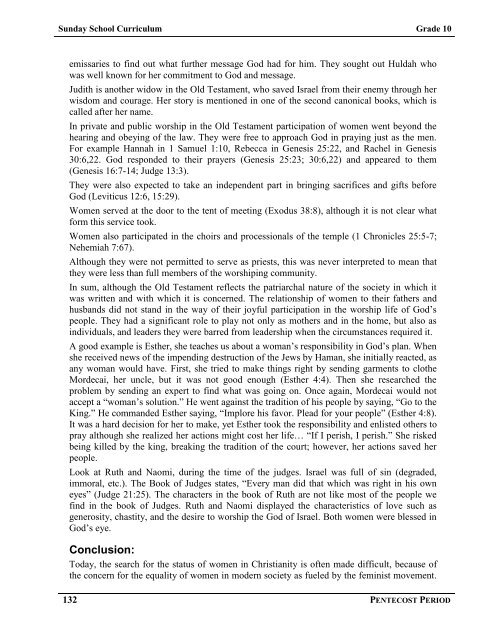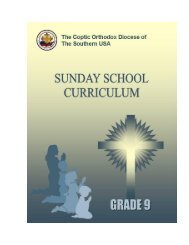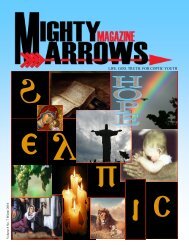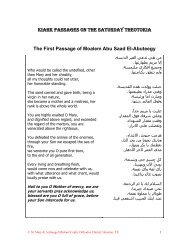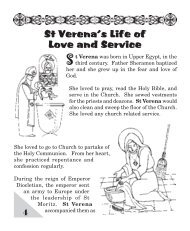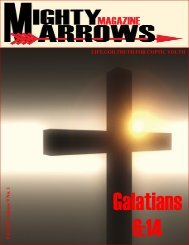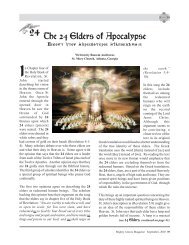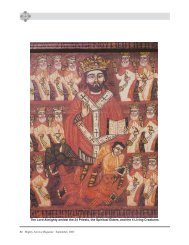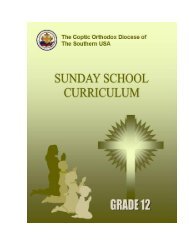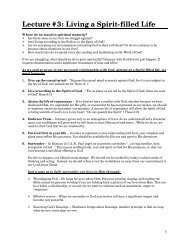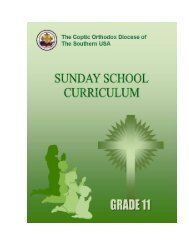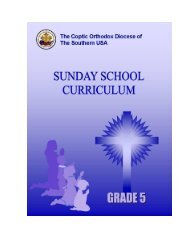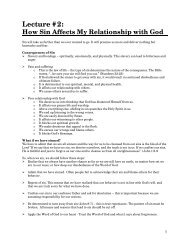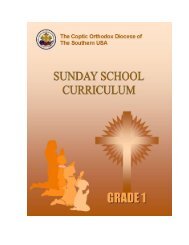Grade 10 - Coptic Orthodox Diocese of the Southern United States
Grade 10 - Coptic Orthodox Diocese of the Southern United States
Grade 10 - Coptic Orthodox Diocese of the Southern United States
You also want an ePaper? Increase the reach of your titles
YUMPU automatically turns print PDFs into web optimized ePapers that Google loves.
Sunday School Curriculum <strong>Grade</strong> <strong>10</strong><br />
emissaries to find out what fur<strong>the</strong>r message God had for him. They sought out Huldah who<br />
was well known for her commitment to God and message.<br />
Judith is ano<strong>the</strong>r widow in <strong>the</strong> Old Testament, who saved Israel from <strong>the</strong>ir enemy through her<br />
wisdom and courage. Her story is mentioned in one <strong>of</strong> <strong>the</strong> second canonical books, which is<br />
called after her name.<br />
In private and public worship in <strong>the</strong> Old Testament participation <strong>of</strong> women went beyond <strong>the</strong><br />
hearing and obeying <strong>of</strong> <strong>the</strong> law. They were free to approach God in praying just as <strong>the</strong> men.<br />
For example Hannah in 1 Samuel 1:<strong>10</strong>, Rebecca in Genesis 25:22, and Rachel in Genesis<br />
30:6,22. God responded to <strong>the</strong>ir prayers (Genesis 25:23; 30:6,22) and appeared to <strong>the</strong>m<br />
(Genesis 16:7-14; Judge 13:3).<br />
They were also expected to take an independent part in bringing sacrifices and gifts before<br />
God (Leviticus 12:6, 15:29).<br />
Women served at <strong>the</strong> door to <strong>the</strong> tent <strong>of</strong> meeting (Exodus 38:8), although it is not clear what<br />
form this service took.<br />
Women also participated in <strong>the</strong> choirs and processionals <strong>of</strong> <strong>the</strong> temple (1 Chronicles 25:5-7;<br />
Nehemiah 7:67).<br />
Although <strong>the</strong>y were not permitted to serve as priests, this was never interpreted to mean that<br />
<strong>the</strong>y were less than full members <strong>of</strong> <strong>the</strong> worshiping community.<br />
In sum, although <strong>the</strong> Old Testament reflects <strong>the</strong> patriarchal nature <strong>of</strong> <strong>the</strong> society in which it<br />
was written and with which it is concerned. The relationship <strong>of</strong> women to <strong>the</strong>ir fa<strong>the</strong>rs and<br />
husbands did not stand in <strong>the</strong> way <strong>of</strong> <strong>the</strong>ir joyful participation in <strong>the</strong> worship life <strong>of</strong> God‘s<br />
people. They had a significant role to play not only as mo<strong>the</strong>rs and in <strong>the</strong> home, but also as<br />
individuals, and leaders <strong>the</strong>y were barred from leadership when <strong>the</strong> circumstances required it.<br />
A good example is Es<strong>the</strong>r, she teaches us about a woman‘s responsibility in God‘s plan. When<br />
she received news <strong>of</strong> <strong>the</strong> impending destruction <strong>of</strong> <strong>the</strong> Jews by Haman, she initially reacted, as<br />
any woman would have. First, she tried to make things right by sending garments to clo<strong>the</strong><br />
Mordecai, her uncle, but it was not good enough (Es<strong>the</strong>r 4:4). Then she researched <strong>the</strong><br />
problem by sending an expert to find what was going on. Once again, Mordecai would not<br />
accept a ―woman‘s solution.‖ He went against <strong>the</strong> tradition <strong>of</strong> his people by saying, ―Go to <strong>the</strong><br />
King.‖ He commanded Es<strong>the</strong>r saying, ―Implore his favor. Plead for your people‖ (Es<strong>the</strong>r 4:8).<br />
It was a hard decision for her to make, yet Es<strong>the</strong>r took <strong>the</strong> responsibility and enlisted o<strong>the</strong>rs to<br />
pray although she realized her actions might cost her life… ―If I perish, I perish.‖ She risked<br />
being killed by <strong>the</strong> king, breaking <strong>the</strong> tradition <strong>of</strong> <strong>the</strong> court; however, her actions saved her<br />
people.<br />
Look at Ruth and Naomi, during <strong>the</strong> time <strong>of</strong> <strong>the</strong> judges. Israel was full <strong>of</strong> sin (degraded,<br />
immoral, etc.). The Book <strong>of</strong> Judges states, ―Every man did that which was right in his own<br />
eyes‖ (Judge 21:25). The characters in <strong>the</strong> book <strong>of</strong> Ruth are not like most <strong>of</strong> <strong>the</strong> people we<br />
find in <strong>the</strong> book <strong>of</strong> Judges. Ruth and Naomi displayed <strong>the</strong> characteristics <strong>of</strong> love such as<br />
generosity, chastity, and <strong>the</strong> desire to worship <strong>the</strong> God <strong>of</strong> Israel. Both women were blessed in<br />
God‘s eye.<br />
Conclusion:<br />
Today, <strong>the</strong> search for <strong>the</strong> status <strong>of</strong> women in Christianity is <strong>of</strong>ten made difficult, because <strong>of</strong><br />
<strong>the</strong> concern for <strong>the</strong> equality <strong>of</strong> women in modern society as fueled by <strong>the</strong> feminist movement.<br />
132 PENTECOST PERIOD


